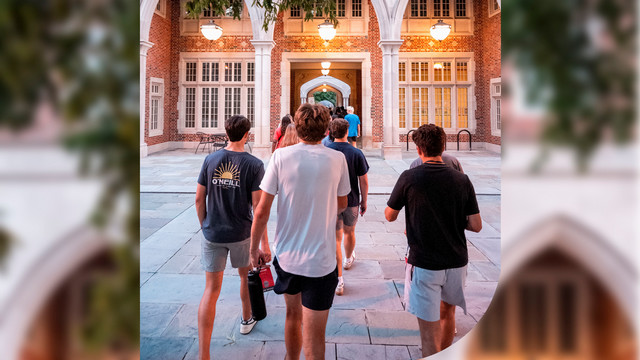Diving into Richmond’s First-Year Seminars
Student Experience
A signature experience of a University of Richmond education is the First-Year Seminar, courses designed to give students the skills they will need to thrive throughout their college career. Incoming students can choose from over 40 topics in small, discussion-based courses taught by enthusiastic professors.
“We hope to help develop students’ intellectual curiosity, giving them a forum in which to explore areas they are already interested in and ones that are entirely new,” said Elisabeth Gruner, director of First-Year Seminars and Writing Across the Curriculum.
Courses cover everything from the history of digital media to society’s fear of technological progress through the lens of the Frankenstein novel.
“We have a terrific roster of FYS classes that allow students to explore a wide variety of topics while developing essential college-level skills in writing, oral communication, critical thinking, and information literacy,” Gruner said.
While some seminars have been offered for years, new ones are available each year. Students often enjoy their FYS so much that they later enroll in additional classes with the same professor or seek them out for guidance.
“This happens in many of our courses,” Gruner said. “The fact that they are small classes with a great deal of individualized attention makes the atmosphere particularly fertile for intellectual development.”
Richmond introduced its FYS program 15 years ago, when such programs were uncommon in higher education. Today, they’re a familiar feature on campuses throughout the U.S.
Andrea Vest, associate director of the Academic Advising Resource Center, helps students select their seminars, which are now taught only in the fall. “I enjoy helping students find the hidden gems — the seminars where their hobbies, interests, and academic curiosities intersect,” she said.
Here are some of this year’s First-Year Seminar offerings:
Devil in the Details: Microhistory & Historical Narrative, Douglas Winiarski, Professor of Religious Studies
This class explores the past through stories of obscure individuals and unusual events, from witches and prophets to heretics. Students will move beyond history books to primary texts such as newspapers and private diaries, ultimately writing their own microhistory about a strange religious sect known as the Vermont Pilgrims.
Digital Communications and Society, Bill Bergman, Marketing Instructor
Consumers are often unaware of how their social media posts or clicks result in their information being sold to marketers. Students will learn about the history of digital media and how social media platforms generate revenue and profits through advertising that provides immediate feedback and supporting data.
Ecotourism and Sustainability, Mary Finley-Brook, Professor of Geography and Global Studies
This seminar looks at landscapes and geographies around the world while exploring approaches to responsible, sustainable tourism. Class visits to Virginia ecotourism sites allow students to record firsthand how social, economic, and ecological processes are interconnected.
Friendship, Collaboration, and Conviviality, Elena Calvillo, Associate Professor of Art & Art History
In this class, students will learn how friendships and conversation in Renaissance Italy and other Early Modern European cultures fostered intellectual and artistic collaborations. They will explore texts and works of art from Greek and Roman antiquity to the European Renaissance.
Geek Chic, Greg Cavenaugh, Visiting Assistant Professor, Rhetoric & Communication Studies
Here’s a landing spot for students interested in learning more about products and activities such as D&D, Star Trek, Eurogaming, anime/manga, and cosplay. Students will become ethnographers by immersing themselves in the subject area, interviewing participants in the cultures, and then writing about them.

